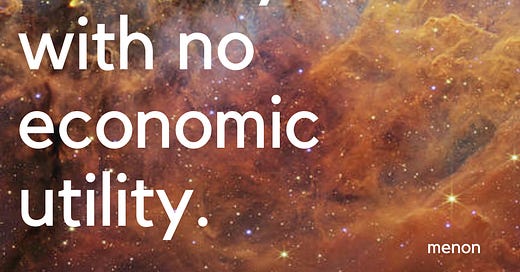curiosity with no economic utility
series of epiphanies while reading “Seven Brief Lessons on Physics” by Carlo Rovelli.
In a developing country, education serves an economic utility. It provides the skilled human capital the economy needs to flourish.
This can happen through social, and parental influence like it does at home in India. Or it can happen through a state-sponsored structure like it did in Singapore.
The system does provide industrial efficiency to countries. Yet, it often comes at a great cost—the death of curiosity in most students, a loss seemingly terminal and contagious.
The loss doesn’t seem to pinch because mediocrity also follows Newton’s second law. But greatness lies far away in realms of chaos. Freedom and chaos have been the breeding ground for geniuses. Einstein is testament.
“Albert was reading Kant and attending occasional lectures at Pavia: for pleasure without being registered there or having to think about exams. It is thus that serious scientists are made.”
Education, in its current form, is designed to curb the chaos.
Education and learning are always in conflict with each other. The former is looked at as a means to an end and the latter becomes a luxury that only academics indulge in.
As I start re-discovering physics outside the confines of entrance exams and college cut-offs, I felt robbed. Robbed of the joy of learning because my future job prospects hinged on the rote mastery of these concepts.
But despite what it seems, this isn’t a for-the-love-of-science ramble. This is about how education fails to do justice to the elementary concepts of science, math, language, and history.
Science and math can teach humility through probability. Through the simple, profound awareness that we may be wrong.
While mentioning an article Einstein wrote that began with, “It seems to me”, Rovelli writes:
“Note the wonderful initial ‘It seems to me…’ which recalls the ‘I think…’ with which Darwin introduces in his notebook the great idea that species evolve, or the ‘hesitation’ spoken of by Faraday when introducing for the first time the revolutionary idea of magnetic fields.
Genius hesitates.”
Language and history can teach us how time is a tool for us to make sense of this world.
“The very structure of our language requires time - a thing ‘is’ or ‘was’ or ‘will be’. It is possible to imagine a world without colours, without matter, even without space, but it’s difficult to imagine one without time.”
The lack of awareness of how elementary education can have meaning beyond marks, and textbooks has given rise to a generation robbed of direction. An entire generation has to look for direction through self-help books, and gurus.
I’m tempted to take this into the direction of sweeping imperatives of fostering curiosity, and scientific temperament in classrooms and beyond. But essays in a remote corner of the internet won’t do much for that. I’ll let my work talk there.
For now, I reflect on the joy of rediscovering the joy of learning physics and equations that shape the world outside the confines of economic utility.
As the friend who tags along with the philosopher, I leave you with what Rovelli left me with the hopes of you rediscovering learning again:
“Here we are on the edge of what we know, in contact with the ocean of the unknown shines the mystery and beauty of the world. And it’s breathtaking.”


